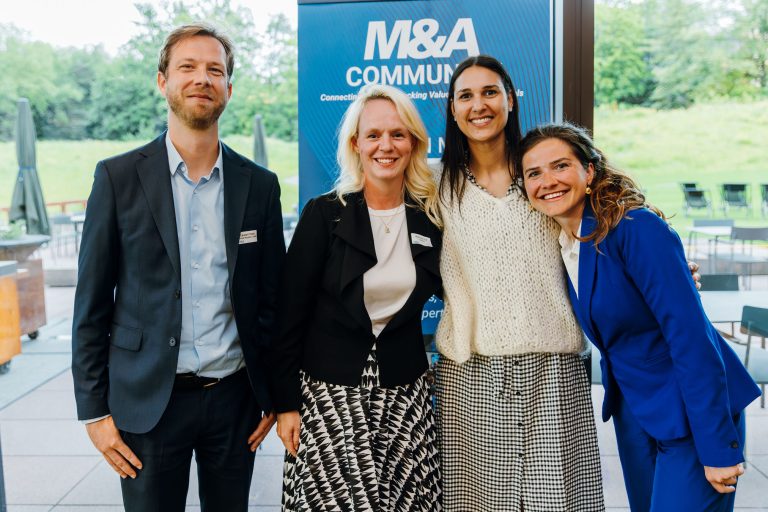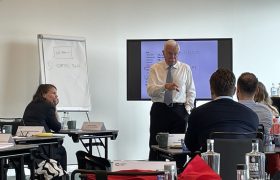Looking Back In Order To Look Forward

From the very beginning, we were promised that this would be a very informal chat, a bit like a conversation among friends at a pub. The setting was perfect for this, as the meeting place was Bar Joule in the former headquarters of insurance company Royal Belge in Watermaal-Bosvoorde. The building rises like a modernist castle in a 10-hectare park and is a prime example of the luxurious corporate architecture of the 1960s. In recent years, it has been tastefully (and expensively) renovated into a gorgeous hotel. Regarding the location, we were certainly off to a good start.

There was no sign of nervousness among the three speakers, a trio that had long gathered their proverbial miles: Ruth De Wulf from Creafund, Charlotte Vanden Daele from GIMV, and Laurent Raets, Partner at Groupe Bruxelles Lambert (GBL).
Coincidence or serendipity?
The three shared stories and anecdotes, sprinkled wisdom, and often gave good old-fashioned advice to their young listeners. Ruth, for instance, talked about taking risks. “If you’re 51% sure about something, just go for it. Don’t think too long about it. Until you’re about 22, you’re in a framework where many of your responsibilities are taken care of by your parents or your teachers. After that, it’s up to you, and then the chaos begins. You get the feeling that everyone is moving faster than you, but that’s not true. Create your own chaos, do something crazy. Or stupid. Or both. For instance, move to another country. Yes, that sounds scary and it is, but it also gives a massive boost to your self-confidence.”
And creating your own chaos isn’t all that hard, apparently. Ruth once wanted to work in New York and sent out more than 100 job application emails, receiving exactly one response. She jumped on a plane, but in The Big Apple, the company in question had completely forgotten who she was or why she was there: Ruth who? What do you do then? In her case, she called all the other offices that had rejected her. One of them relented and hired her… if she agreed to work for two months for free, which she did. Much later, Ruth was on the ferry from Hoboken to Manhattan when an American recognized a Dutch slogan on her bag. They started talking, and two months later, he offered her a job. Coincidence or serendipity?
The great advantage of doing crazy, unexpected, or risky things, according to Ruth, is that you can almost always undo them. Like a CTRL-Z-button for your life. “If you move to another country and it doesn’t work out, you just come back. It is almost always possible to return to your previous situation, so why not take the leap?”

Time is on your side
Charlotte pointed out two great advantage the young attendees have: time and a brain. “You have time to make mistakes, time to do what you want, time to change your mind. I worked as a lawyer in a law firm. There, you’re typically an ‘associate’ for seven or eight years and then you become a ‘partner.’ And that’s it, there are only two career steps. After you become a partner, that’s your fate for the next thirty years. If you want that, fine, but not everyone envisions such a career. But you have to make choices. Most people in M&A have second advantage: they’re smart and sought after by companies. So you have time and the opportunity to experiment. You don’t have to stay loyal to one company for your entire life, nor do you have to stay loyal to one partner your entire life.”
For Ruth, Charlotte’s argument was the perfect setup for the next tip: if you want something, you must dare to ask for it. “Many people think, ‘Why don’t they ask me?’ or ‘I can do that just as well as my colleague, but I wasn’t asked.’ Then ask for it yourself! If you want something, you have to have the balls to ask. I once worked at JP Morgan in London, where I got in with a grant. London was great, but the department I worked in was not. I wanted to move to another department, but my grant wouldn’t count there. But I asked anyway. Not only was I allowed to go, but later they changed the rules of the grant. And besides, even if your request is denied, it gives you a sense of control.”
Laurent countered Ruth and Charlotte’s stories immediately. “I’ve known my wife since I was twelve, I’ve been in the same job for seventeen years, and I only do things I trust 100%,” he said with the timing of a seasoned stand-up comedian. But he fully agreed on one thing: travel. “I haven’t done nearly enough of that.”

Laurent shared another important lesson: never underestimate the power of networking. “I was the son of two teachers and got a job at Deloitte. The first question they asked was, ‘Who do you know? What’s your network? Where can you introduce us?’ And there I was: I had nothing to offer… nowhere. Hey, I understand, you work hard, and you want to spend your scarce free time with your family…it’s natural. But you also have to connect with other people. Don’t go to networking events to drink, talk to people.”
“I’m not a natural networker myself; it’s hard for me, and I don’t really enjoy it”, said Charlotte. “But what I’ve learned is that you have to be patient. Don’t expect networking to pay off in two weeks, or two months, or even two years. Don’t be too hard on yourself: if you meet one new person, it’s already good. Be happy with one new LinkedIn-contact. Eventually, you will reap the benefits.”
That guy
In the M&A world, you also have a fantastic asset that can bring enormous advantages, but that can also quickly fade: your reputation. “The investment world is a reputation business,” said Laurent. “You can be tough, you can ask hard questions, you can dive into the details…but behave properly. A done deal is a done deal. Don’t go back on it, or everyone will eventually see you as ‘that guy.’ And that reputation is incredibly hard to shake.”
“I would even say: don’t be a dick,” said Ruth. “There are quite a few people who are, but that usually comes from that little internal voice that gives them so much insecurity. Forget that voice; you have the skills, and there are more than enough jobs and deals and money for everyone. At an investment bank in London, there was a colleague who did not like me. I don’t know why, but she really hated me. It got so bad that my boss asked me if he should talk to her. I said: absolutely not. I approached her myself; I told her I knew she didn’t like me and that I did not understand why – we hardly ever spoke. And then I invited her for a few drinks at a bar. And now we’re friends and we help each other out. Being nice pays off. I sometimes force myself to have a conversation with a stranger every day, even if it’s just asking someone on the subway what book they’re reading. But it teaches you how to interact with people and how to make a connection.”
Charlotte had another remarkable point: you are probably smarter than your boss. “And I mean that in the least douchey way possible,” she laughed. “It’s not because you know more, but because you’re unique. How you think, the solutions you come up with… that’s unique to you. I often had good ideas in meetings, but I didn’t say anything because I assumed such a simple, obvious idea had probably already been suggested 1,000 times. And usually, that turned out not to be the case. So: speak up, even if you think you’re stating the obvious. And also: never just assume things. With every assignment I get now, I want the full picture. Do they want me to work on this over the weekend? No problem, I’ll do it, but tell me upfront. I won’t just assume it.”
The story
Laurent had the final word. “It’s always about the story. If I see on a resume that someone had five jobs in the last five years, a red light starts blinking, but if they have a good explanation, it’s OK with me. Better that than being frustrated in the same job for twenty years.”
And with that, it was time to put an important lesson into practice: networking is important. The bar was the ideal place for that.

Take a look at the pictures here.
Thank you Ansarada for sponsoring the Young M&A Forum.








